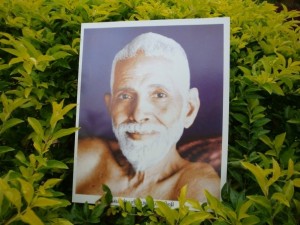SRI RAMANA MAHARSHI, HERBAL MEDICINE

> DOWNLOADS, BIOGRAPHY, MEDICINAL RECIPES <
> DR. V. MANICKAM – SRI RAMANA HERBS <
Sri Ramana Maharshi (Tamil: ரமண மஹரிஷி) (December 30, 1879 – April 14, 1950), born Venkataraman Iyer, was an Indian sage. He was born to a Tamil-speaking Brahmin family in Tiruchuzhi, Tamil Nadu. After having attained liberation at the age of 16, he left home for Arunachala, a mountain considered sacred by Hindus, at Tiruvannamalai, and lived there for the rest of his life. Arunachala is located in Tamil Nadu, South India. Although born a Brahmin, after having attained moksha he declared himself an „Atiasrami“, a Sastraic state of unattachment to anything in life and beyond all caste restrictions.
Sri Ramana maintained that the purest form of his teachings was the powerful silence which radiated from his presence and quieted the minds of those attuned to it. He gave verbal teachings only for the benefit of those who could not understand his silence. His verbal teachings were said to flow from his direct experience of Consciousness as the only existing reality. When asked for advice, he recommended self-enquiry as the fastest path to moksha. Though his primary teaching is associated with Non-dualism, Advaita Vedanta, and Jnana yoga, he recommended Bhakti to those he saw were fit for it, and gave his approval to a variety of paths and practices. Read more: > Here <
Bhagavan Ramana and Herbal Medicine
By Dr Manikkam
The essence of all beings is earth. The essence of earth is water. The essence of water is the herb. The essence of the herb is the human being. So says a maxim of the Chandogya Upanishad.
The health traditions of India extend to thousands of years. It perhaps started with the cave man who consumed roots, leaves and herbs raw before discovering fire and subsequently the means of cooking. In this, however, man was only imitating the animals which consumed plants to alleviate health disorders. Nature has provided animals with hindsight that helps them recognise symptoms of bodily disorders, the means of selfdiagnosis and self-medication. The monkey provides one of the most common and best examples. To this, we shall revert later. In India, before codified medicinal systems like Ayurveda and Siddha took roots, folk curative traditions based on observation and experimentation were developed and nurtured.
This tradition had its variants in accordance with climate, terrain and habits; but the essence was the same. The plant kingdom was considered the saviour. General health disorders were treated by a combination of various plants and herbs. Each and every part of a plant was useful root, bark, stem, leaf, flower, fruit and seed. Methods were developed to extract the maximum benefits from each of the parts of a plant. This glorious tradition which was the forerunner to Siddha and Ayurveda, was passed through word of mouth to successive generations. The grandmother in the house was the main custodian of this oral tradition. Proverbs were created and repeated any number of times by the elders in the family to emphasise the importance of healthy living, both physical as well as mental. These proverbs have stood the test of time and they remain intact to guide us. The properties and benefits of herbs and plants were enshrined in easy to understand language.
All Indian languages had their own variants of these health proverbs. The most important feature of the ancient Indian systems of medicine is to look at the human being as a whole entity. The physiological part of it was not divorced from the psychological and the psychical. The body, mind and soul were not treated separately, but as constituting a wholesome single entity. Ancient puranic tradition has it that this system was practised by the rishis, siddhas and devas, the celestial beings. The siddhas were seekers after God. It was they who scientifically developed and nurtured various disciplines such as yoga, medicine, linguistics and other allied arts and sciences.
FULL TEXT ABOUT HERBAL SYSTEM, MEDICINE, RECIPE´s and more: > HERE <
Dr. Manickam and his family are very humble devotees of Bhagavan. His tradition is ‚Herbal Medicine‘, which combines Herbal remedies with the Ayurvedic and Siddha systems of medicine using modern diagnostic techniques. He uses and researches some of the medicinal recipes created by Bhagavan Sri Ramana Maharshi, plus those of his father and grandfather.
All of Bhagavan’s recipes replace the more traditional Ayurvedic ones with pure herbal formulae, which have been found by doctor Manickam to have many times the potency and effectiveness of the traditional recipes. They also have no known side-effects.
All of Bhagavan’s recipes use herbs found on and around Arunachala, this of course adds priceless value to those recipes.
Anyone suffering from ailments and not happy with Western treatments can contact Dr. Manickam at the address and telephone number below …..
Dr. V. Manickam
Sri Ramana Herbs
54-c Mathalangula Street
Tiruvannamalai – 606 601
Tamil Nadu
South India
-
Telephone: (0091) 4175 251937 – NEW Telephone number
- Email – Dr Manickam <drmanickam_tvm@sify.com> – NEW E-mail address.
-
Dr. Manickam is a registered practitioner … Reg. No. 10327 (H)
Tiruvannamalai Charities Supported by This Site:
The three charities listed below have been thoroughly checked by myself and all are genuine.
Ramana Maharshi Rangammal Memorial Hospital and School – 1.4 Mb
Shanthimalai Research & Development Trust – 1.0 Mb
Sanmarga Dayasramam Trust – 1.4 Mb
> Meet Ramana Maharshi Groups, Friends, Studies, Fans at facebook <
> Meet Sri Ramana Seva Ashram,Rachapalli at facebook <
> Meet Herbals & Naturals at facebook <
> Meet Arsha Vidya Gurukulam, Studies, Friends, Fans, at fb <
> Meet Advaita Vedanta,Groups,Friends,Studies, Vivekananda at fb <
Comments are closed.